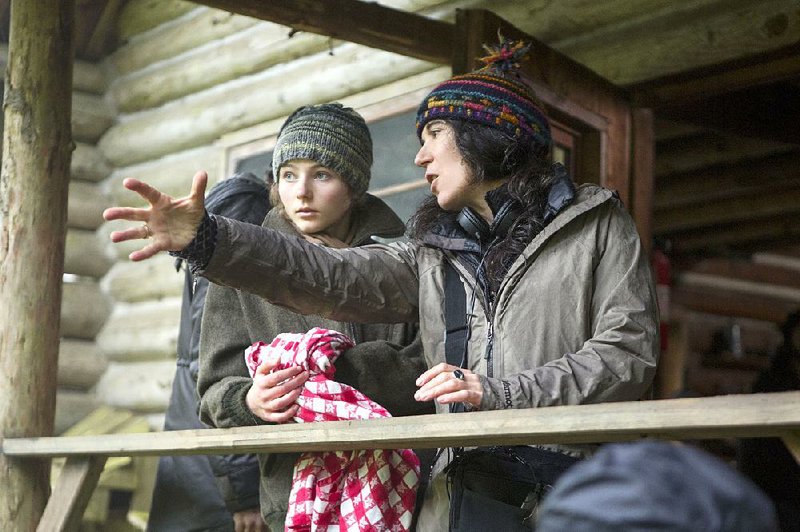"It's always been kind of compelling ... to try to understand what it's like in places I don't know necessarily what it's like to live," filmmaker Debra Granik says by phone from Montreal. "Some filmmakers make films about what they do know, and I'm always trying to make films about what I haven't experienced, but what I would like to know something about.
"When you go to a new ecosystem, you have to be so receptive to what [is] 'utterly local' knowledge. That's something I seek out in our big country. I seek out the idea of regionalism. I like the idea that to this day, no matter how digital we get and how much the Internet changes things, there are sayings that differ. There's different skill sets. There's different customs, different outlooks. I do like to appreciate that because it's hard to be in a big country. It's been stressful in the last couple of years, in particular -- not that that's the first time. I always say to myself, if we're going to make the effort to stay together as a big country, let's appreciate some of the differences that exist."
From watching her movies, it's hard to believe the writer-director was born in Cambridge, Mass., and grew up in Washington and New York. Her 2004 debut feature, Down to the Bone, starred Vera Farmiga as an upstate New York drug addict who finds that getting off of cocaine is difficult when her bosses at the grocery store expect her to work the same grueling pace without artificial stimulants.
Granik's next film 2010's Winter's Bone followed an Ozark teenager trying to pay off her deadbeat father's debts while practically raising her younger siblings because her mother is an invalid. Without an ounce of East Coast condescension, the movie earned Oscar nominations for best film, leading lady Jennifer Lawrence, co-star John Hawkes and for the script Granik and Anne Rosellini adapted from Daniel Woodrell's novel.
Her new movie, Leave No Trace, takes her to the other side of the country. The film concerns a father and daughter named Will (Ben Foster) and Tom (Thomasin McKenzie) who try to live by foraging in Forest Park, west of downtown Portland, Ore. An earnest social worker (Dana Millican) attempts to make the two live and work with the rest of Oregon, but Will has great difficulty adjusting to life where people use matches if they start their own fires at all.
Thirteen-year-old Tom may not have the social experience of her peers, but she's bright enough for school and can cook using a solar reflector. Will has similar skills (he taught her, obviously), but coming back from serving in the military makes him prefer living in the woods, even if Forest Park is beloved public property.
"It's not sustainable how they're living, but it's in search of something that would be sustainable," Granik says. "They don't have the means to get it. If you don't own property, it's very hard to navigate life in an alternative way or do with less or to extricate yourself from what we would call the normative practices of everyday life that are very much in play and enforced in urban life or in town life.
"Philosophers have been asking for decades: What if I pulled out of it and lived with a whole lot less? What if I didn't subscribe to the idea of bigger, better, more and material acquisition? What if I wanted a simpler life?"
Winter's Bone features a long sequence where Lawrence effortlessly skins a squirrel, so that she and her family can eat. Similarly, Tom and Will make meals with what surrounds them in the park. While both sequences might seem similar, Granik says that living off the land is very different in southern Missouri from western Oregon.
"The first person who inspired me was actually someone from Missouri," she says. "He'd been a very good adviser on Winter's Bone, a guy named Bo Brown, who's part of that wonderful subculture that actually exists in all the states: people who can light fires without matches, people who can build the shelters.
"He referred us to a friend of his named Nicole (Apelian) who was the coach and teacher for Leave No Trace. She lives in the Northwest. Bo said, 'I can't help you with Oregon because all I know is the trees in my region. I know how to build a shelter with the trees that are in my forest that I live in. I know what food I would forage in Missouri. I cannot tell you what would be edible. You'd have to go to the source. You have to go to a teacher who lives there.'"
Unfortunately, Forest Park isn't the best place to test one's survival skills or even shoot a movie about it.
"Forest Park is very beloved to the city of Portland," she says. "It's one of the biggest municipal city parks in the country -- or the biggest. As you learn more about that park, it's just a very rich endowment for the city of Portland. They love it. You cannot trample it. It receives thousands of visitors, schoolchildren. Everyone in Portland loves that park, I would say. It was very important for us to move 20 miles outside of Portland and go to a county park in Clackamas County and have a ranger who was a real expert on how a crew could work and not trample it and not devastate it.
"We worked in close concert with the park rangers and greensmen so what we could do what we needed to do. Also we were not a high tech crew, we were not an army with tanks rolling in. Our gear stayed in the paved parking lot. We walked our gear in."
MovieStyle on 07/13/2018

